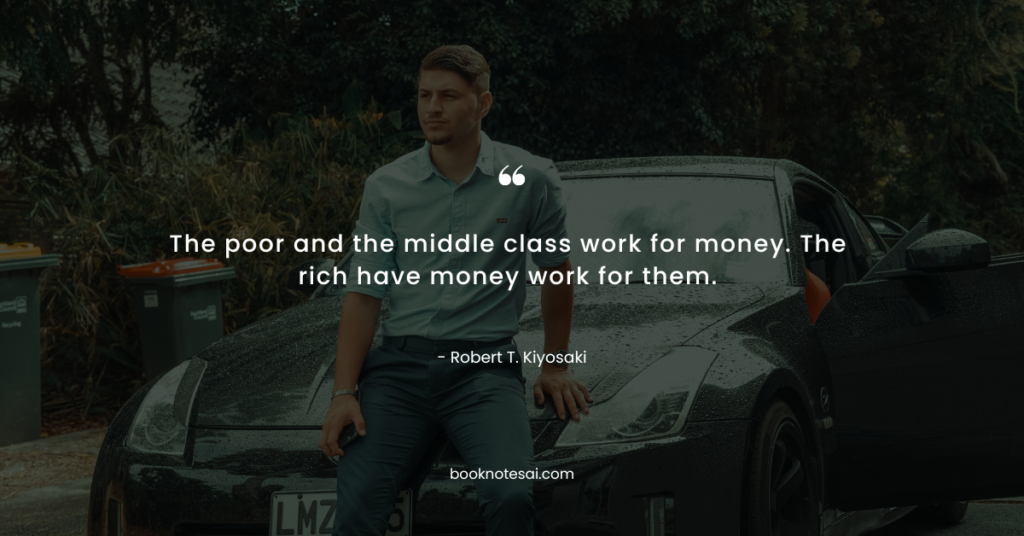Listen To This Post
What the Rich Teach Their Kids About Money That the Poor and Middle Class Do Not!
The book explodes the myth that you need to earn a high income to be rich and explains the difference between working for money and having your money work for you.

This is a book summary for Rich Dad Poor Dad by Robert T. Kiyosaki. The most essential information is streamlined and structured to be practical, straightforward, and incredibly valuable, all while saving you tons of time.
Introduction: Why this book?
- Discover the secrets to financial success in “Rich Dad Poor Dad” as Robert T. Kiyosaki shares profound insights into the mindset and strategies that distinguish the wealthy from the rest.
- This book challenges conventional wisdom, urging readers to invest time in understanding how to make money work for them and redefine their approach to wealth creation.
Rich Dad Poor Dad Summary:
- Kiyosaki contrasts the financial philosophies of his two father figures: one poor but highly educated (his biological father), and the other, his friend’s father (his ‘rich dad’), who was financially savvy despite lacking formal education.
- The book emphasizes the importance of financial education, distinguishing between assets and liabilities, understanding cash flow, and building passive income streams to attain financial freedom.
- Kiyosaki encourages readers to adopt a mindset focused on asset accumulation, entrepreneurship, and investment in real estate and other income-generating ventures.
- He highlights the significance of embracing risk, learning from failures, and continuously expanding one’s financial IQ to navigate the complex world of money effectively.
- Ultimately, “Rich Dad Poor Dad” advocates for financial literacy as the cornerstone of wealth creation and challenges conventional beliefs about money and success.
💡 5 Big Ideas
- The Power of Financial Education: Kiyosaki advocates for continuous learning about money and investments to make informed financial decisions, emphasizing that formal education often lacks practical financial lessons.
- Distinguishing Assets from Liabilities: Understanding the difference between assets (which generate income) and liabilities (which incur expenses) is crucial for building wealth, according to Kiyosaki.
- The Importance of Mindset: Kiyosaki stresses the significance of adopting a mindset that embraces risk-taking, resilience, and learning from failures as essential components of financial success.
- Generating Passive Income: The book highlights the necessity of creating passive income streams, such as real estate investments or business ownership, to achieve financial freedom and break free from the cycle of working for money.
- Financial Independence Through Investments: Kiyosaki encourages readers to invest wisely, diversify their portfolios, and seek opportunities that align with their financial goals to attain lasting wealth and security.
In summary, “Rich Dad Poor Dad” presents a blueprint for financial empowerment, urging readers to prioritize financial education, leverage assets, cultivate a wealth-oriented mindset, generate passive income, and make strategic investments to attain financial independence.
Powerful Quotes
- “The single most powerful asset we all have is our mind. If it is trained well, it can create enormous wealth.”
This quote emphasizes the importance of mindset in achieving financial success. - “In school, we learn that mistakes are bad, and we are punished for making them. Yet, if you look at the way humans are designed to learn, we learn by making mistakes.”
Kiyosaki highlights the value of learning through trial and error. - “The poor and the middle class work for money. The rich have money work for them.”
This quote underscores the importance of passive income in wealth creation. - “The love of money is the root of all evil. The lack of money is the root of all evil.”
Kiyosaki challenges traditional beliefs about money and its role in society. - “Winners are not afraid of losing. But losers are. Failure is part of the process of success.”
This quote encourages embracing failure as a stepping stone to success. - “Often, the more money you make the more money you spend; that’s why more money doesn’t make you rich – assets make you rich.”
Kiyosaki emphasizes the distinction between income and wealth. - “If you want to be rich, you need to develop your vision. You must be standing on the edge of time gazing into the future.”
This quote underscores the importance of vision and foresight in financial success. - “The most successful people in life are the ones who ask questions. They’re always learning. They’re always growing. They’re always pushing.”
Kiyosaki highlights the importance of curiosity and continuous learning. - “You’re only poor if you give up. The most important thing is that you did something. Most people only talk and dream of getting rich. You’ve done something.”
This quote emphasizes the value of taking action towards financial goals. - “Intelligence solves problems and produces money. Money without financial intelligence is money soon gone.”
Kiyosaki stresses the importance of financial literacy in wealth preservation.
One Reason To Read This Book:
This book offers a transformative perspective on wealth and financial independence, providing practical insights and strategies applicable to anyone seeking financial empowerment.
Who should I recommend Rich Dad Poor Dad Summary to?
You could recommend “Rich Dad Poor Dad” book summary to individuals of all ages and backgrounds who aspire to gain a deeper understanding of personal finance and wealth creation.
Whether you’re a young professional starting your career or someone seeking to revamp your financial habits, this book offers valuable lessons that transcend age and demographics.
Recommendations:
- “The Millionaire Next Door” by Thomas J. Stanley and William D. Danko.
- “The Richest Man in Babylon” by George S. Clason.
- TED Talk: “How to Build Your Financial Confidence” by Mellody Hobso
This summary serves as a complimentary guide to the reviewed title Rich Dad Poor Dad offering key insights. For a deeper understanding, we encourage you to explore the full book.


